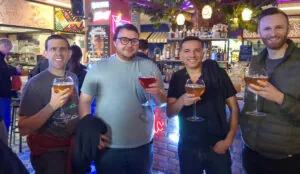Koha Hackfest, Marseille 2024
16th April 2024 | Martin Renvoize
The development team were joined by Andrew Auld and Jonathan Field in attending this year’s annual Koha Hackfest event hosted by our friends Biblibre at their headquarters in Marseille, France from 8th to 12th April 2024.
Taking a different form this year after our draft submission of topics proved very popular and it fell to us to make sure everything got covered. The Koha Hackfest program was split into 3 tracks; Organisation and Vision (Discussions regarding community, workflows, communications etc), Doing (Working on and discussing features in Koha) and the Side (Other interesting things not directly related to Koha) track.
Our full notes are available here, but to summarise our top takes from each track follow:
Organisation and vision
This was a big topic this year; The Koha Community continues to grow and with that growth we face new challenges in trying to modernise, adapt and attract new contributors.
We engaged in several discussions regarding the challenges we encounter in organising the various stakeholders within the community. Topics included our response to security reports, management of development roadmaps, and collaboration on larger projects within teams to solicit input before pursuing goals.
Jonathan Field and Brendan Gallagher proposed the establishment of a Foundation, specifically recommending our alignment with the Open Library Foundation after conducting research. This suggestion garnered widespread approval in the room, sparking insightful questions and consensus on next steps. Stay tuned for further updates and an upcoming open vote. Establishing a foundation would enable us to receive donations as a community and transparently set collective goals.
Furthermore, we collectively acknowledged the outdated nature of our current communication channels, which hinder participation from new members. With strong support, we decided to pilot a new chat system, aiming to eventually transition away from IRC and embrace more accessible technologies. Additionally, we unanimously agreed to explore trialling the Discourse forum tool as a replacement for the existing mailing lists, which are increasingly challenging to maintain and have seen declining activity.
Doing
The general theme of work and discussions this year was around modernisation, new ideas and attracting new developers.

We held a series of sessions delving into core functionalities within Koha, covering various topics such as the extensive array of system preferences, the architecture of the permissions system, and the concept of elevating plugins to a more prominent position within Koha.
The group concluded that although the system preferences are extensive, they hold significance, and we should explore new ways to present them rather than aiming to reduce their number. We also agreed to trial some new approaches to the permissions system, focusing on reevaluating the foundations and gradually building toward implementing a clear role-based access control system.
Our aim is to empower developers to explore innovative approaches, leveraging modern frameworks for server, front end, and unit testing code. PTFS Europe has proposed a strategy focused on developing a centralized plugin store, facilitating the trial and promotion of code, ultimately enhancing the discoverability and reliability of plugins.
Additionally, we examined the rationale behind past decisions and their current relevance. This included discussions on the database schema, which remains constrained by outdated table and field naming conventions, contrasting with the progressive evolution of code, API, and UI with more intuitive naming conventions. We also explored avenues for modernising the notices tooling, advocating for the overdue adoption of template toolkit and the phasing-out of Koha’s custom template system.
Side
The side track focused on giving people the opportunity to showcase work they’d been doing and talk about anything else that didn’t obviously fit into the other tracks.
Lots of little sessions were included in this track, so I won’t try to cover them all, but to highlight a few we enjoyed:
- Jonathan D ran a short session to showcase the ongoing work to automate screenshots for translations of the Koha documentation.
- LMSCloud showed us the list of features in their Koha branch to facilitate feedback on what and how we might port their local customisations into community Koha.
- A team of us came up with a plan to embellish the existing sample data used for the sandboxes, development environments and automated screenshots tooling.
- A group talked about google and why it may or may not be indexing your catalogue.
- We talked about the new translation platform, Weblate.
Social
The Hackfest is also a great opportunity for developers and librarians interested in Koha to meet up face to face. Many of us have day to day dealings with each other in chat and via Bugzilla reports but we don’t often get a chance to meet up in person. The Hackfest gives us all a chance to let our hair down and get to know the people behind the keyboards.

We had groups going for early morning runs, late afternoon swims in the ocean and hikes up the hill to Basilica of Notre-Dame of la Garde. We enjoyed evenings out eating together and discussions over perhaps a few too many drinks on occasion.